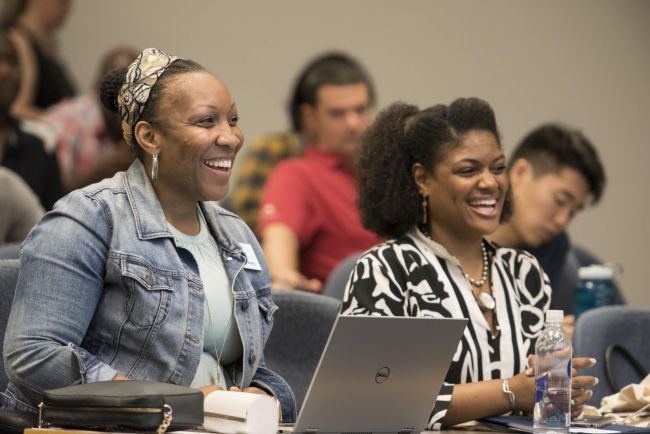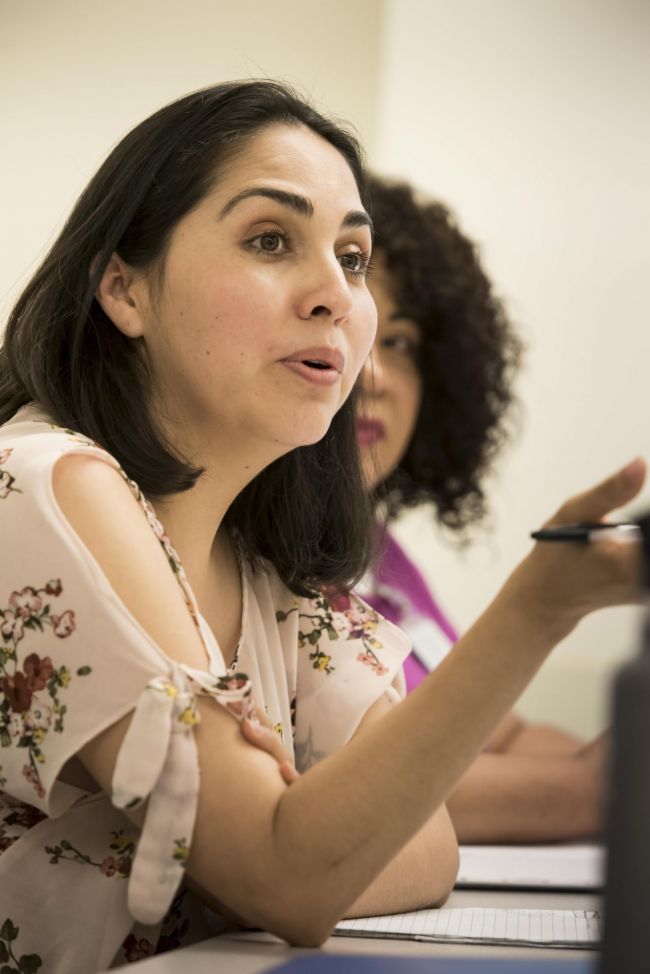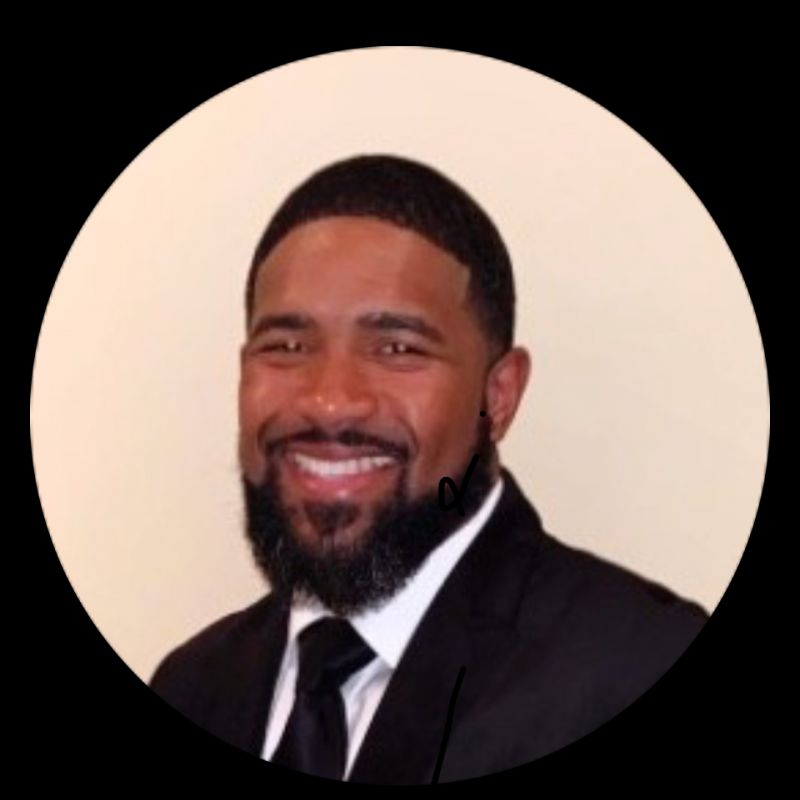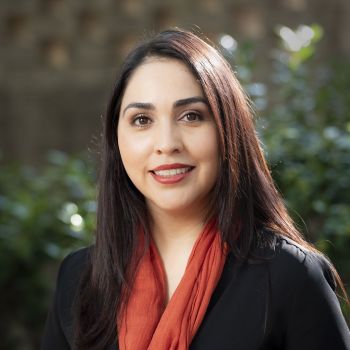Come expand your theological imagination, grapple with practical problems, and continue a journey of transformation and reconciliation with a wide community at Duke Divinity School's Summer Institute for Transformation and Reconciliation. At this annual event, the focus on transformation and reconciliation is grounded in a distinctively Christian vision within a framework that is richly practical, contextual, and theological.
Rooted in the Duke Divinity School conviction that reconciliation is at the heart of the gospel of Jesus Christ, the institute draws on the strengths of a faculty of world-class scholars and practitioners. Since God’s ministry of reconciliation is entrusted to all Christians, the institute is designed to equip and inspire leaders who participate in God’s ministry of reconciliation as a journey of pain, hope and courage. These leaders will cultivate a robust vision and practices of Christian transformation and reconciliation that are faithful to the scriptural witness, discerning of the times, and sensitive to the life of the church.
The institute centers on content with a biblical vision of reconciliation that inspires a movement of transformed communities and relationships. This formation of communities is nurtured by each other’s witness that Christ is strengthening us to the end and affirming us so that we do not “lack any spiritual gift” in our life together (1 Corinthians 1:4-9). As an integral part of the Divinity School and rooted in a Christian vision of God’s ministry of reconciliation, the institute aims to serve the academy, the church, and the world.
Registration for the next Institute will open in early 2026.
2025 Daily Program
| Time | Event |
|---|---|
| 8:45-9:15 a.m. | Morning Worship |
| 9:30 a.m. - noon | Plenary Session Each morning, the Summer Institute for Transformation and Reconciliation includes a plenary talk given by preeminent scholars and practitioners in the fields of Christian theology, reconciliation, and transformation. Plenary speakers use scriptural interpretation, theology, and storytelling to weave a rich tapestry of reflection that is theological, contextual, and practical. Plenary sessions include time for Q&A with these scholars and practitioners.
|
| 12:15-1:15 p.m. | Lunch Break |
| 1:15-2:45 p.m. | Breakout Session I |
| 3:00-4:30 or 5:00 p.m. | Breakout Session II |
| 5:10-5:30 p.m. | Closing Worship & Reflection (Wednesday and Thursday) |
| After 5:30 p.m. | Evening events
|
The next Summer Institute for Transformation and Reconciliation will take place in person from May 13-15, 2026 on the Duke Divinity campus.
This institute will consist of three full days of engagement. Each day will include worship, daily plenary sessions (Common Journey), interactive discussion, Q&A portions, and breakout sessions related to reconciliation, transformation, and justice.
The formation that takes place at the Summer Institute for Transformation and Reconciliation builds on critical questions that frame our content and design. These questions address the heart of the journey of reconciliation. Our “Word Made Flesh” methodology explores the theological, contextual, and practical dimensions of this movement of hope and liberation toward justpeace. Plenary speakers will be invited to consider how/where their work intersects and leads toward peace-building, justice, resilience, restoration, equity, inclusion and belonging and to examine how/where faith communities have a role to play in practices of transformation and reconciliation.
The questions being explored in our Common Journey:
- New Creation — “Reconciliation toward what end?” — This is a question about the goal, so this first day anchors us in our destination. Where does this journey end? This question invites the participant to form a scriptural imagination of the gift of new creation.
- Lament — “Where are we and how did we get here?” — This is a question of context, which seeks to get to a clearer understanding of the specific challenges through seeing, naming, and standing in the brokenness. How has the past shaped the present? This question invites the participant to develop the gift and discipline of lament.
- Liberation, Hope and Resilience — “What do hope and resilience look like?” — This is a question of process, which highlights models, stories, and experiments that sustain a new future. We understand liberation and reconciliation to be concurrent processes. Where can we see signs pointing toward hope and liberation? What practices, rhythms, and life-styles sustain people and communities, even in the face of current challenges, so they might continue the work of peace-building and justice? The question invites the participant into a vision, imagination, and capacity for hope and resilience.
Our "Word Made Flesh" methodology explores the theological, contextual, and practical dimensions of this movement of hope and liberation toward justpeace.
The Summer Institute for Transformation and Reconciliation is intended for:
- Pastors and Christian leaders who desire to equip their congregations/teams to become communities that practice conflict transformation and address the social divisions that fragment our world
- Christian leaders who are committed to the ongoing training and equipping of others, who inspire and support people to become ambassadors of God’s movement of hope and liberation
- Grass-roots ministers and Christians living and working among the suffering and marginalized
- College, university, and seminary faculty and administrators seeking to deepen their theological understanding of connections to their own fields
- Denominational and organizational leaders seeking to guide their organizations into new practices that support the flourishing of communities living out God’s vision of justpeace





2025 Institute Speakers




















Wednesday Breakout Sessions
Each afternoon of the Summer Institute, there will be two sections of breakout sessions offered on relevant topics. The first section begins at 1:15 p.m. and the second section begins at 3 p.m. See the brief descriptions below to learn more about Wednesday's sessions.
Continued conversation with plenary speakers from Wednesday morning.
Presenters: Dr. Ryan Juskus, Center for Social Concerns, University of Notre Dame & Rev. Donna Banks, Senior Pastor, Epworth United Methodist Church
This seminar describes and critiques issues and realities in the American criminal justice system. Models of restorative justice, prison ministry, and the role of faith communities in forming such ministries are explored.
Presenter: Rev. Dr. Louis Threatt, Senior Pastor, Cities of Refuge Christian Church
Drawing from scripture and contemporary creation justice work, this workshop will examine how traditional interpretations of power have influenced our relationship with the earth and discover how Jesus' model of self-giving love offers a revolutionary framework for ecological justice.
Presenter: Avery Davis Lamb, Executive Director, Creation Justice Ministries
This session will engage forgiveness with a framework of accountability that welcomes relational responsibility to God and other people. This session will draw on 25 years of research on the psychology of forgiveness (granting and seeking) -- addressing ways to respond internally to the humans involved in the harm. We will address the emotional and physical side-effects of strategies that can help us toggle out of rumination and into mindsets that help us tell more of the truth (not less) with accountability, forgiveness, and hope.
Presenter: Dr. Charlotte VanOyen Witvliet, Professor of Psychology, Hope College
Many attitudes, preferences, and stereotypes affect our understanding, actions, and decisions in an unconscious manner. These evaluations, based on associative learning, are activated involuntarily and cause us to have feelings and attitudes about others based on characteristics such as race, gender, age, and appearance. Because we rely on our default thinking to move through the world, uncovering our biases and understanding their effects on others are critical in seeking transformation and reconciliation in our world. This session will define and uncover different types of narratives that we carry about others, examine their structural and systemic impact, and seek ways to help our intentions and outcomes align to increase justice and equity.
Presenter: Rev. Dr. Yvette Pressley
This session will focus on naming the stories we tell about hunger in our local communities, uncovering hidden narratives about the root causes of hunger, and using scripture, personal narrative, and other sacred stories to create new stories about food access.
Presenters: Come to the Table Staff at RAFI, Justine Post, Director, David Allen, Program Manager, and Jarred White, Project Manager, Farm and Faith Partnerships
Thursday Breakout Sessions
Each afternoon of the Summer Institute, there will be two sections of breakout sessions offered on relevant topics. The first section begins at 1:15 p.m. and the second section begins at 3 p.m. See the brief descriptions below to learn more about Thursday's sessions.
Continued conversation with plenary speakers.
Presenters: Dr. Alma Tinoco Ruiz, Assistant Professor of the Practice of Homiletics and Evangelism, Director of the Hispanic House of Studies, Duke Divinity School & Rev. Douglas Day Kaufman, Executive Director, Anabaptist Climate Collaborative
In this interactive workshop, we will explore the biblical basis for “blessing” Abraham’s seed. Looking to the interpretive traditions of both Judaism and Christianity, we will consider whether alternative readings of these key texts might support a more faithful and fruitful quest for justpeace in the Holy Land.
Presenters: Dr. Nina Balmaceda, Director for the Center for Reconciliation, Duke Divinity School & Dr. Ross Wagner, Associate Professor of New Testament, Duke Divinity School
Communal Christian worship practices--public prayer, Bible reading, preaching, baptism, the Lord's Supper, singing, and more--can inspire, fortify, and embolden practices of peacemaking and reconciliation. They can also inspire, fortify, and embolden complicit resistance to them. In this session we will reflect together on the different experiences we each have of worship's role in faithful Christian witness, and also engage in exercises that help us see the shalom-shaping potential for those called to shape public worship for God's people and for those called to prepare God's people for their participation in worship.
Presenter: Dr. John D. Witvliet, Director, Calvin Institute of Christian Worship
The lives of marginalized women testify to the current state of our medical, economic and social systems. Taking the issue of maternal health as a case study, we will explore how health, spirituality, ethnicity/race, and gender are important considerations in health disparities. In this session we will attend to stories of women and communities who experience health, religious, and economic institutions from the “underside” (from a point of marginalization, disadvantage). Focusing on maternal health, we will illustrate how addressing the health and social challenges of women who suffer disproportionately from the burdens of health disparities can help us imagine and create environments where the lives of all women and their communities can flourish.
Presenter: Dr. Wylin Wilson, Assistant Professor of Theological Ethics, Duke Divinity School
We will explore the complex emotions that make it easier for so many people to be apathetic about creation care and climate justice, though some of us are also anxious. Then we will consider some spiritual, theological and communal resources congregations can offer to move people into active engagement.
Presenter: Rev. Douglas Day Kaufman, Executive Director, Anabaptist Climate Collaborative
Resources will be available for those who wish to engage in some self-guided spiritual practices of contemplation. Example activities include:
- Prayer labyrinth
- Duke Gardens meditation
- Visio Divina activity
Friday Breakout Sessions
Each afternoon of the Summer Institute, there will be two sections of breakout sessions offered on relevant topics. The first section begins at 1:15 p.m. and the second section begins at 3 p.m. See the brief descriptions below to learn more about Friday's sessions.
Continued conversation with plenary speakers.
Presenters: Rev. Dr. Benjamin Chavis, Jr., Inaugural Environmental Justice and Racial Equity Fellow, Duke University & Dr. Rebecca Vidra, Senior Lecturer, Marine Conservation and Ethics, Nicholas School of the Environment, Duke University
Dietrich Bonhoeffer is considered one of the most influential Protestant theologians of the 20th century. Like all of us, Bonhoeffer had many sides: as a son, friend, lover, pastor, prisoner, and theologian. Can we discern some of these different faces? The many perspectives show the depth of his thought and help us see the complex, multidimensional person behind his writings. We can appreciate this diversity and learn from the various facets of Dietrich Bonhoeffer that we discover in studying his life and thought. After all, aren’t we all people with many sides, seen differently by those we meet?
Presenter: Dr. Wojciech Szczerba, Rector, Evangelical School of Theology, Poland
Spadework is the arduous, patient, hopeful work of preparing the soil for seeds and ultimately a harvest. Spadework is what Ella Baker called her work. Ms. Baker (1903-1986) was a grass-roots organizer from North Carolina, who criticized top-down, charismatic leadership. Instead, she listened to students and local people and helped them find their own voices and build lasting, nonviolent movements of shared power. She called that work of listening spadework. At RAWtools South, we make spades from gun parts, and we support people who are cultivating peace in their communities. In this session we will explore the challenges of gun violence, and we will listen to one another as we identify and call out the work we are given to do to cultivate the Beloved Community.
Presenters: Stan Wilson, Co-pastor of Circles of Mercy, staff at RAWtools
In this session, we will watch the short film “Faith in Blackness: An Exploration of Afro-Latine Spirituality” by the AfroLatine Theology Project. This film will frame our conversation as we explore how an intersectional approach to history, spirituality, theology, and our own life can allow us to lead towards hope more effectively. During the session, we will engage in activities that will invite you to self-assess and see how your own positionality and intersectionalities influence your perspective and how the awareness of this can positively impact your work towards reconciliation.
Presenter: Yolanda Santiago Correa, Program Coordinator, Hispanic House of Studies, Duke Divinity School
Pullen Memorial Baptist Church became aware of the Community of the Cross of Nails (CCN) around 1974 and has been an active participant in this reconciliation community since then. Based on her role as staff to Pullen’s social justice ministry, Rev. Cathy Tamsberg will share the story of her congregation’s engagement with CCN, how it understands its ministry to be part of the global CCN ministry of reconciliation, and ways other congregations might consider becoming partners in this life-giving work.
Presenter: Rev. Cathy Tamsberg, Retired Associate Pastor, Pullen Memorial Baptist Church
In this session, we will discuss the biblical teachings around welcoming the foreigner, explore the prevailing myths about refugees and immigrants in our country, discuss how to address the concerns that well-meaning parishioners may have about these new arrivals, and then look at ways the Church in its various incarnations can serve and advocate for these newcomers.
Presenter: Garry Crites, Church and Community Engagement Manager, World Relief
Lodging, transportation, and meals other than lunch are the responsibility of attendees.
Lodging:
There are no on-campus accommodations. Durham has many hotels and short term rentals (Airbnb) close to the Duke campus.
Meals:
Lunch and snacks will be provided throughout the institute. You are on your own for breakfast and dinner.
We are committed to reducing our impact on our environment. We encourage you to bring a refillable water bottle/coffee mug for use throughout the institute. We will be using paper and compostable products.
Parking:
The closest parking lot to the Duke Divinity School is the Bryan Center Parking Garage (PGIV). Discounted on campus parking will be available for purchase with registration. Otherwise, campus lots charge $2/hour with no daily maximum.
Transportation:
The Raleigh-Durham International Airport (RDU) is the closest airport. A ride from the airport to campus should take around 30 minutes. There is no public transportation between the airport and campus.
Weather:
The temperature in Durham in mid-May usually ranges between 65 and 95 degrees Fahrenheit (18 -35 Celsius) and there are often thunderstorms in the afternoon at this time of year. Please feel free to dress comfortably during the institute. You will especially want to have comfortable shoes and an umbrella. The air-conditioning in some of Duke’s classrooms can be quite cold, so you may also want to bring a sweater or light jacket.
Questions? Email dukesummerinstitute@div.duke.edu
Questions?
Contact us at dukesummerinstitute@div.duke.edu
